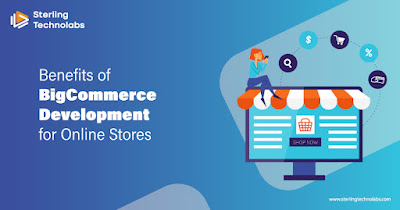With the rise of e-commerce, online stores are becoming increasingly popular for businesses to sell their products and services. However, building an online store from scratch can take time and effort, especially for small businesses with limited resources. This is where BigCommerce comes in as a powerful e-commerce platform that can help businesses create an online store quickly and easily. This article will discuss the benefits of BigCommerce development for online stores.
What is BigCommerce Development?
BigCommerce is an e-commerce platform enabling businesses to create and manage online stores. The platform offers a range of features and functionalities that make it easy for businesses to set up an online store, manage products and inventory, and process orders and payments. BigCommerce is a cloud-based platform, meaning businesses can access their online stores from anywhere, anytime, using any device with an internet connection.
What are BigCommerce online stores?
BigCommerce online stores are highly customizable, meaning businesses can create a unique store that reflects their brand identity and values. The platform offers a range of themes and templates that businesses can use to create their online store or create a custom design using the platform’s built-in design tools. BigCommerce also offers a range of add-ons and integrations that businesses can use to enhance their online store’s functionality and user experience.
Why BigCommerce Development Services?
BigCommerce development services are provided by various web development companies specialising in building and maintaining online stores using the BigCommerce platform. These companies offer various services, including design and development, customization, integration, migration, and support. They can help businesses create a unique online store that meets their specific needs and requirements, and they can provide ongoing support to ensure that the online store runs smoothly and effectively.
Benefits of BigCommerce Development for Online Stores
- Easy to use: The platform comes with a user-friendly interface and a range of customization options that make it easy for businesses to set up and manage their online stores. This is especially important for small businesses and startups that may not have the resources to hire a dedicated IT team or web developer. With BigCommerce, businesses can easily add products, manage inventory, process payments, and handle shipping and taxes without needing extensive technical expertise.
- Scalability: The platform is designed to accommodate businesses of all sizes, from small startups to large enterprises, and can handle high volumes of traffic and transactions without compromising on performance. This is important for businesses that are looking to grow and expand their online presence. As businesses grow and attract more customers, they need a platform that can scale with their needs and handle increased traffic and sales. With BigCommerce, businesses can easily add new products, expand their online store, and handle high volumes of traffic and transactions without worrying about performance or downtime.
- Security: BigCommerce is a secure platform that uses advanced security measures to protect customer data and prevent fraud. It is PCI-compliant and uses SSL encryption to ensure all transactions are secure.
- Mobile responsive: BigCommerce is mobile-responsive, which means that online stores built on this platform can be accessed from any device, including smartphones and tablets. This is essential in today’s mobile-first world, where more and more customers are shopping online using their mobile devices.
- Customization: BigCommerce offers various customization options, including themes, plugins, and APIs. This allows businesses to tailor their online store to their specific needs and create a unique and engaging shopping experience for their customers.
- SEO-friendly: BigCommerce is SEO-friendly, which is designed to help businesses optimise their online stores for search engines. This can help businesses attract more traffic to their site and increase their visibility online.
Conclusion
Sterling Technolabs, a leading eCommerce development company, offers a range of benefits for businesses looking to build and manage their online stores using BigCommerce. Sterling Technolabs has extensive experience in developing customised online stores tailored to each business’s unique needs. By leveraging the benefits of BigCommerce, Sterling Technolabs can help businesses create a seamless and engaging shopping experience for their customers, optimise their online store for search engines, and handle high volumes of traffic and transactions without compromising performance. Overall, Sterling Technolabs is an excellent partner for businesses looking to take their online store to the next level with BigCommerce development.






